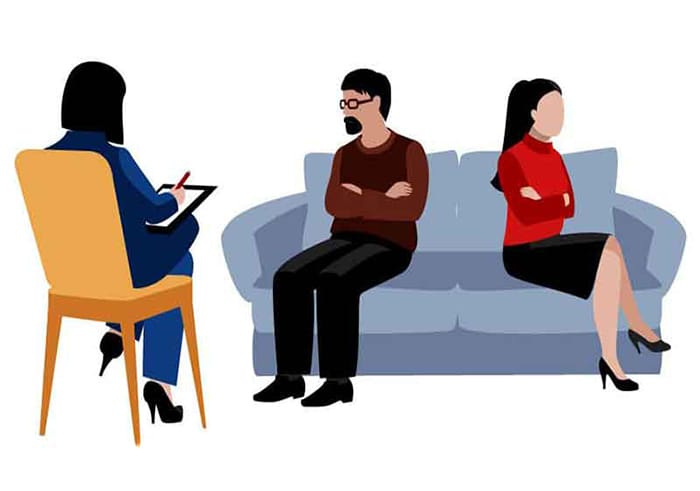
Blog
Emotion-oriented approach

The emotion-centered approach is based on the assumption that our personal identity is deeply connected with our emotions, and it presents emotions as the core of therapy, and also says that our emotions influence our behaviors, and by changing the experience of emotions, Our behaviors also change.
فهرست عناوین
ToggleOne of the unique features of emotion-focused therapy is its compliance with the basic principles of attachment theory, which is of great scientific importance. This theory states that our need to experience a safe and secure connection with someone in childhood and later in emotional relationships is a basic biological need. So it’s clear why relationship challenges can lead to unhappiness; Because these challenges may reduce responsiveness to our basic needs and make us feel insecure about the presence and responsiveness of our emotional partner. Our desires not only reflect our needs and expectations, but also signal a cry for help, a request to be loved in a certain way.
The main assumptions of EFT emphasize that our emotional patterns, which include feelings and beliefs, are formed during childhood and adolescence and influence our interactions with others and our life experiences. This concept clearly shows that human communication and the way we act are strongly related to our emotional structures. In other words, the way we experience life and communicate with other people affects our emotions and the regulation of our emotions.
The emotion-oriented approach emphasizes the idea that human emotions are dependent on human needs and therefore emotions have a natural adaptive potential. If these feelings are activated and people move through them, it can help change difficult emotional states and improve interpersonal relationships.
EFT helps people better understand their emotional patterns, reduce emotional avoidance behaviors, and ultimately lead them to a better life.
History of emotion-oriented approach
Emotion-oriented therapy, which was initially known as experiential-process psychotherapy, is a result of the third wave of psychotherapy. This theory was invented in the 1980s by two doctors named Susan Johnson and Les Greenberg. They were influenced by humanistic and experimental psychotherapies of Carl Rogers and Fritz Perls. Johnson and Greenberg also emphasized that each person’s behavior depends on the action or reaction of another. This led them to understand that problems arise from repetitive patterns of interactions between two people. It should also be noted that Susan Johnson’s actions have been mainly focused in the field of couple therapy.
Emotion-oriented treatment is one of the important methods in the field of psychology and psychotherapy. This type of treatment is usually inspired by cognitive-behavioral, person-centered, and gestalt methods and promotes the improvement of psychological issues through working with deep feelings and individual emotions. to give Also, taking inspiration from the emotion-oriented approach from famous research approaches such as Piaget’s theory helps to better understand issues and solve individual problems.

Types of Emotionally Focused Therapy
Emotionally Focused Therapy (EFT) is divided into three categories based on target groups:
- Emotionally Focused Family Therapy (EFFT)
- Emotionally Focused Couples Therapy (EFCT)
- Emotionally Focused Individual Therapy (EFIT)
This method was originally developed for couples, but with some modifications, it has also been applied to families and individuals.
Emotionally Focused Family Therapy
Emotionally Focused Family Therapy is a powerful and effective intervention that helps families cope with distress, build stronger relationships, and improve communication. This approach focuses on emotional connections between family members and emphasizes the importance of understanding each other’s feelings.
The goal of this approach is to help families better understand and manage their emotions while fostering positive and secure relationships.
When is Emotionally Focused Family Therapy Used?
Emotionally Focused Family Therapy is effective for families dealing with various issues such as conflict, communication problems, parent-child relationship difficulties, and trauma or loss-related challenges. This approach can be used for the following objectives:
- Increasing understanding and communication between family members
- Strengthening communication and problem-solving skills
- Promoting healthy attachment bonds
- Reducing conflict and emotional distress
- Helping family members process difficult emotions

Emotionally Focused Couples Therapy
- Phase 1: De-escalation
- Phase 2: Restructuring the Bond
- Final Phase: Consolidation and Integration
Emotionally Focused Couples Therapy (EFT) is a short-term, structured approach to psychotherapy that typically requires 8 to 20 sessions. The goal of this approach is to create a more secure emotional attachment between partners. The EFT method is effective for couples facing various issues such as post-traumatic stress disorder, depression, frequent arguments, infidelity, and chronic health conditions. It consists of three phases:
De-escalation
This phase helps individuals identify and understand the negative patterns in their relationships and recognize how these patterns affect their interactions, creating mutual distress between partners.
Restructuring the Bond
In Emotionally Focused Couples Therapy, the second phase, which focuses on restructuring the emotional bond, is particularly important. This phase examines the fundamental and interactive patterns within a relationship.
The therapist helps couples better understand their attachment styles and how these emotional needs influence their feelings and responses. Partners learn how to express their emotions and needs to each other in this phase. Gradually, they are taught to respond to each other’s needs with empathy and real, supportive reactions.
Consolidation and Integration
In the context of relationship psychology and couples therapy, the final phase, called consolidation and integration, is where partners practice and enhance their communication skills in order to establish new patterns of interaction. As with learning any new skill, effective use of new techniques requires practice and repetition.
During this phase, the therapist acts as a coach, offering guidance and helping couples get back on track when they face challenges.
Further reading suggestion: Family psychology

Emotionally Focused Individual Therapy
Emotions have both positive and negative effects on individuals. Positive emotions can help people improve their well-being, enhance social connections, and support physical health. On the other hand, negative emotions can lead to dissatisfaction and exhaustion, causing mental health issues such as anxiety and depression.
Emotionally Focused Individual Therapy (EFIT) is a type of psychotherapy that helps individuals learn how to identify and process their emotions so they can better manage them. The goal of this approach is to assist individuals in recognizing their emotional responses and developing new strategies to regulate these emotions, ultimately leading to a happier and healthier life.
When is Emotionally Focused Individual Therapy Used?
Emotion-focused therapy can be helpful for people who struggle with a variety of distressing emotions, such as sadness, fear, anger, and guilt. It can also help those dealing with relationship issues and emotional trauma. This approach can be used for:
- Resolving underlying issues
- Improving communication within a relationship
- Increasing understanding and acceptance of one’s emotions
What Disorders is Emotionally Focused Therapy Effective For?
Although the emotionally focused approach was initially developed to reduce the effects of mood disorders, particularly depression, over time, it has become recognized as one of the most effective therapeutic methods for addressing emotional relationship issues and resolving family conflicts.
If you’re facing challenges in any of the following areas and feel ineffective in your life, seeking help from a therapist trained in Emotionally Focused Therapy (EFT) can be highly beneficial:
- Anxiety Disorders
- Mood disorders
- Depression
- Panic attacks
- Borderline personality disorder
- Sleep disorders
- Eating disorders
- Excessive perfectionism
- Rumination
- Interpersonal relationship issues
- Marital conflicts
A therapist trained in Emotionally Focused Therapy can help you become more aware of and understand your emotions. These professionals can provide coping strategies to help you face and manage your feelings.
برای مشاوره رایگان و رزرو وقت (یا اگر تماس گرفتید و قادر به پاسخگویی نبودیم) شماره تماس خود را وارد کنید. ما به زودی با شما تماس می گیریم!



